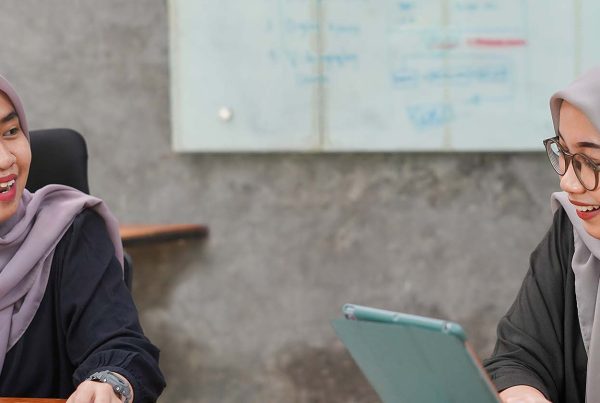For a researcher in the Global South, working for the development sector more often than not follows a depressingly familiar pattern.
Expectation: Set a vision, define a research question, design the methodology, apply for a proposal, get the funding, start the research work, get published, achieve the impact and advocate it sustainably!
Reality: Get a project, meet the milestone, never get recognised, complete the report, forget the vision. Get another funding and repeat!
Does this “projectisation” of the sector sound familiar? Well, that is the reality of most organisations in the development sector as we speak. In a rush to check off tasks, the development sector has long forgotten the “why” behind its work. In the hustle to complete our projects, we have created an unethical research environment. The root cause of this is the manner in which research is designed. Existing data collection and research designs follow top-down approaches that typically involve flying in academics from richer countries and getting them to design the research and train enumerators in lower-income countries. These academics extract the data and take it home to good Wi-Fi and excellent library access, eventually publishing in closed-access journals that people in lower-income countries cannot afford. This body of work feeds into the evidence for policy making, despite it lacking localised context from people who have lived experience in the particular development issue the project was aiming to solve. This is the colonial mentality the development sector has!
Decolonisation as a process is mainly a critique on such extractivist research models. It aims to dismantle the legacies of colonialism and its influence in our contemporary experiences. The importance of research is often missed out in debates about decolonisation. The practice of people in the Global North devising research questions without following inclusive methods is in itself an extractivist model. Now, in recognising this, we are hoping Global South researchers will actually define research. Decolonisation is about commitments to the ideals of liberty, equality, and fraternity, as argued by Frantz Fanon of Black Skin, White Masks fame (Fanon, 1952/2008). In this work, Fanon starts with the most crucial aspect of decolonisation — language. Language is crucial because it is fundamentally how people communicate. Language continues to be a burning issue, not least because a central colonialist policy was to enforce the preeminence of the colonisers language. This has had a lasting impact; for example, I am from India, where to this day English is still very much the determinant for getting a good job and livelihood.
Steps Towards Being an Ally and Collaborator
1. Let’s Shift Agency and Power Back to Local Team Context
Decolonisation demands affirmative action. Bottom-up theories of socioeconomic change and transformation, cultural competencies, and lived experiences should be prioritised. Steps should be taken to actively populate our reading lists, our references, our citations, with critical voices from the Global South.
The relationship the researcher has with those being researched is a crucial element for shifting agency. Rather than emphasising a preset hypothesis of a nonlocal researcher, it is essential to develop a view based on the research participants’ needs. A needs assessment is a suitable methodology for achieving this. Researchers engaging in decolonisation argue that indigenous communities are often underrepresented in academic research communities, and that their concerns regarding the same are not heard (Asselin & Basile, 2018). Critical questions to answer when trying to shift the agency back to local teams are: how do assumptions about power affect what we select as problems for research, who pays for this research, who conducts the investigation, and what purpose does the study serve (University of Warwick, 2018)? It is important to question who produces knowledge, what knowledge is produced, and whose agenda knowledge serves. How should we produce and disseminate knowledge?
Decolonising the current model means that power and resources need to shift to the Global South, where most research happens. Whether it be opening a branch in a local area, hiring local people, or letting local people publish, this shift will involve capacity building and intentionality of unlearning biases. That will need investment and effort but should be non-negotiable if we want research results to be relevant and impactful for those whom the funding was meant to serve.
2. Let’s Emphasise Participatory Methods in Research
To walk the talk, we also need institutional change. Here, we – in the development sector, must revisit formal and informal rules that reproduce racist, sexist, casteist, ableist, and classist hierarchies.
Currently, we often see visits led by donors who are White, where development agencies must show an impact through a few stories based on field visits, just so that the report looks good. It is almost like aid tourism, and this form of “karma colonialism” should be avoided at all costs (for examples, see https://karmacolonialism.org/). Saranel Benjamin, now Head of Partnerships at Oxfam, noted that giving donors a good experience is so essential for money to come again. When recounting her experiences in South Africa as part of development programmes funded by Western donors, most of the visitors, Benjamin noticed, were White men, a reflection of the majority White workforce in the central offices of development agencies back in the Global North, where the key decisions were made. This dynamic became readily apparent to Benjamin when she moved to work in the international development sector full time (Cooney, 2020).
None of this means that there is no space for nonlocal people to participate, but it does mean nonlocal researchers recognising their privilege to become better allies (Asselin & Basile, 2018). Instead of reinstating views of power and dominance embodied in the colonialism-inspired saviour complex, the research sector needs to “pass on the mic” to where it belongs, or create space for those in the Global South to own the mic (Alyson, 2020).
3. Let’s Reimagine the Development Sector
A reimagined development sector is one in which we tackle inequalities head-on within and between countries and regions of the world through the structural transformation of the global economy.
In this reimagined development sector, context would drive policymaking in practice, rather than adopting a one-size-fits-all approach to achieving socioeconomic change. This would force us to consult endogenous development actors, incorporate their inputs, and, most importantly, explicitly acknowledge their contributions.
Mainstreaming decolonisation for development is more important now than, I would say, ever before. As we have seen from the resurgence of #BlackLivesMatter protests across the globe following the brutal murders of George Floyd and Breonna Taylor, and from data that people of colour have been disproportionately impacted by COVID-19, we know that people of colour experience inequalities and discrimination at alarming rates.
Therefore, we have to invite researchers in the development sector to reflect on their positionality and their privilege and to support the efforts from the Global South to lead their own development.
Includovate’s Commitment to Decolonising Research
At Includovate, we are trying something new by designing research projects differently. This means using human-centric and participatory approaches, organising a team so that people with lived experiences and various cultural competencies work together and lead projects, and giving more focus to homegrown solutions and co-creation.
Starting as a small group of committed feminist researchers and growing into an organisation with over 40 staff located globally, Includovate now has a network of 700 researchers around the world. We build the abilities of local researchers to lead, publish, and improve the quality of studies performed in low-income countries. Includovate incubates researchers and facilitates their voice in knowledge creation. Of Includovate’s staff, 62% are women, 7% identify as persons with a disability, and 71% are from sub-Saharan Africa. We at Incluodvate are connecting and empowering people to overcome the norms that lead to poverty, inequality, and injustice.
Present-day research in the development sector is inequitable and perpetuates further exclusion. There is a need to change how studies are designed, generated, published, and used. There is a need to decolonise research to make it more homegrown. Decolonisation really means that people with power and privilege stop hogging the research space and instead act as allies, helping to ensure true equality in the research sector.
Call to Action
Want to support local researchers from Ethiopia get published?
Support our campaign to decolonise research here: https://startsomegood.com/IncludovateRaisesTheBar
References
Asselin, H., & Basile, S. (2018). Concrete Ways to Decolonize Research. ACME, 17(3), 643–650. https://acme-journal.org/index.php/acme/article/view/1707.
Cooney, R. (2020, October 16). Saranel Benjamin: “We can’t just say we’re ‘doing decolonisation’ and think we’ve done a good job”. ThirdSector. https://www.thirdsector.co.uk/saranel-benjamin-we-cant-just-say-were-doing-decolonisation-think-weve-done-good-job/management/article/1697238
Fanon, F. (2008). Black Skin, White Masks (C.L. Markmann, Trans., new ed.). Pluto Press. http://abahlali.org/files/__Black_Skin__White_Masks__Pluto_Classics_.pdf (Original work published 1952)
University of Warwick. (2018, March 15). What is decolonising methodology? https://warwick.ac.uk/fac/soc/ces/research/current/socialtheory/maps/decolonising/
Kanika Joshi
Kanika Joshi manages global outreach for Includovate as Head of Partnerships and Communications. She is a researcher and development practitioner with a multi-sectoral understanding of working with changemakers across the global south and is deeply passionate about youth building solutions for sustainable development. Her thematic areas of interest are youth inclusion, gender equality, and sustainable development.
Prior to this, she worked as a Research Manager with LEAD at Krea University in India on women entrepreneurship and financial inclusion for the last mile and in Kenya as a Fellow Consultant with TechnoServe on food security related USAID project in East Africa. She also contributes as a Global Senior Advisor to the Youth Solutions Program at UN SDSN Youth, where she has been key in setting up the Youth Solutions Report with a diverse team of passionate individuals. Connect through her LinkedIn profile.



